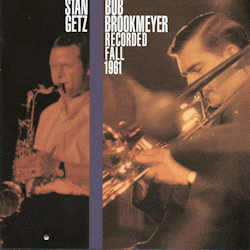1. Minuet Circa
2. Who Could Care
3. Nice Work If You Can Get It
4. Thump Thump Thump
5. A Nightingale Sang In Berkeley Square
6. Love Jumped Out
7. Airgun*
8. Wildwood*
9. Where Do You Go?*
10. Autumn Leaves*
Personnel:
STAN GETZ, tenor saxophone
BOB BROOKMEYER, valve trombone
STEVE KUHN, piano
JOHN NEVES, bass
ROY HAYNES, drums
Recorded New York, September 12 & 13, 1961.
[73:18]
*Bonus Tracks (7-10)
Same personnel except Bob Brookmeyer omitted, & Jimmy Garrison
replaces John Neves
Recorded live at Birdland, New York, November 11, 1961
Getz and Brookmeyer collaborations started way back in 1952 and continued sporadically throughout the 50s, 60s and 70’s, ending in some concert dates in
Japan in September 1981. Here we have the complete original LP they recorded together in the fall of 1961, released on Verve. They make the perfect foil
for each other, Getz’s warm, caressing sound set against Brookmeyer’s varied timbres and wide coloristic range.
We kick off with Minuet Circa ’61, which is a Brookmeyer composition, and is the longest track on the disc. It offers a vehicle to showcase the
capabilities of the tenor saxophone and valve trombone, their voices interweaving in an imaginative, spontaneous dialogue. Who Could Care, which
follows, is from the same pen. Getz’s light, feathery tone adds just the right colour to this slow, dreamy number, with time almost standing still. As it’s
name suggests, in Thump Thump Thump, which completes the Brookmeyer triptych, Roy Hays displays some virtuosic drum work. Two ‘standards’ are
included. The familiar Nice Work If You Can Get It, is dusted down and given a revamp, and their take on George and Ira Gershwin’s A Nightingale Sang In Berkeley Square is that of an intimate conversation between two old friends. Love Jumped Out by Buck Clayton sounds
like it could be the opening theme to a 1970’s late Saturday night chat show.
The welcome bonus tracks of the Birdland session were recorded live two months later in November 1961. Here we have a quartet formation, without Brookmeyer
and with Jimmy Garrison replacing John Neves on bass. As a live gig with announcements and applause, audio quality is a little dim at times, in no way
matching the studio recording. Nevertheless, Getz’s effortless improvisatory skill in Airgun is compelling. In contrast, his poetic lyricism,
shaping of line and pianissimo control in Where Do You Go? is wondrous.
The 16 page booklet includes the original liner notes, written by Nat Hentoff.
Stephen Greenbank
